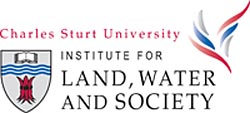Evidence is mounting to suggest that rural landholders are already adapting to climatic variability regardless of their stance on climate change.
Professor Allan Curtis from Charles Sturt University’s (CSU) Institute of Land, Water and Society says research shows landholders in south eastern Australia are at the cutting-edge in dealing with a changing climate that’s bringing a decline in rainfall, temperature rises and a substantially reduced water flow through major river systems.
Professor Curtis will speak at a national forum Rural Landholder Responses to Climate Change hosted by the Institute of Land, Water and Society on Tuesday 17 and Wednesday 18 November at CSU at Albury-Wodonga. The forum will bring together 34 leading social scientists from across Australia.
“The actions landholders take to respond to climate change are likely to have an important bearing on food production, our environment and in some cases, the viability of towns,” Professor Curtis said.
“Our research indicates that landholders are responding, often ahead of complete knowledge or without support from government. To some extent they have no choice; they must act or go under.
“Landholder responses vary but can include actions such as updating on-property infrastructure, planting different crops, buying land in higher rainfall areas, building assets off-farm and seeking off-property income.”
Kevin Goss, CEO of the Future Farm Industries Cooperative Research Centre will open the forum with a challenge for government policy and social science. He believes current thinking on technological change for greenhouse gas mitigation is flawed because “as good as farmers have been in adopting new practices the cycle of innovation, technological development, due diligence to avoid unintended harm and adaptation for different parts of Australia will take decades not just a few years”.
“The talk in the media at present about large scale reforestation for carbon or bio-energy and technical fixes for methane emissions border on social engineering. There’s a real lack of appreciation by policy-makers of how economic and social adjustment works in Australia’s diverse agriculture,” said Mr Goss.
“The aim of the forum is to get the leading social scientists to share their ideas, identify research opportunities and develop collaborative partnerships. This is a critical task if we are to make the most effective use of our research capacities,” Professor Curtis said.






Social
Explore the world of social